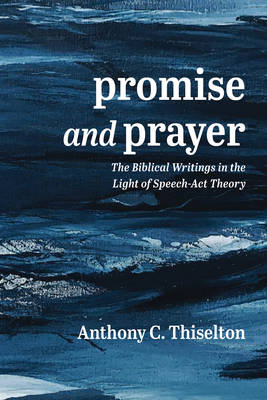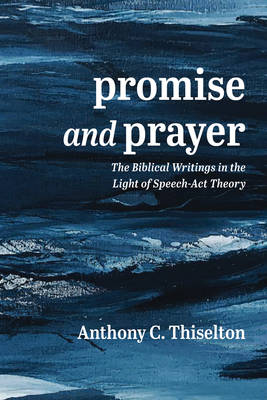
Bedankt voor het vertrouwen het afgelopen jaar! Om jou te bedanken bieden we GRATIS verzending (in België) aan op alles gedurende de hele maand januari.
- Afhalen na 1 uur in een winkel met voorraad
- In januari gratis thuislevering in België
- Ruim aanbod met 7 miljoen producten
Bedankt voor het vertrouwen het afgelopen jaar! Om jou te bedanken bieden we GRATIS verzending (in België) aan op alles gedurende de hele maand januari.
- Afhalen na 1 uur in een winkel met voorraad
- In januari gratis thuislevering in België
- Ruim aanbod met 7 miljoen producten
Zoeken
Promise and Prayer
The Biblical Writings in the Light of Speech-ACT Theory
Anthony C Thiselton
Hardcover | Engels
€ 54,45
+ 108 punten
Uitvoering
Omschrijving
In the Bible, promise and prayer are essential and connected components of the inter-personal relationship between God and his people. And both promise and prayer are kinds of action undertaken by means of speaking, utterances philosophers refer to as speech acts. In the case of promises this is clear: they constitute firm commitments to act in certain ways under appropriate conditions. This book considers biblical examples of divine promise, from both Old and New Testaments. All speech acts depend upon institutional facts, and Thiselton argues that in the biblical writings Divine promises are based on the prior institution of God's covenant. That same covenant forms the institutional context of prayer. Thiselton shows how different kinds of prayer--blessing, thanksgiving and praise, petition and intercession--count as speech acts in different ways and to different degrees.
Specificaties
Betrokkenen
- Auteur(s):
- Uitgeverij:
Inhoud
- Aantal bladzijden:
- 126
- Taal:
- Engels
Eigenschappen
- Productcode (EAN):
- 9781725253612
- Verschijningsdatum:
- 12/11/2020
- Uitvoering:
- Hardcover
- Formaat:
- Genaaid
- Afmetingen:
- 140 mm x 216 mm
- Gewicht:
- 312 g

Alleen bij Standaard Boekhandel
+ 108 punten op je klantenkaart van Standaard Boekhandel
Beoordelingen
We publiceren alleen reviews die voldoen aan de voorwaarden voor reviews. Bekijk onze voorwaarden voor reviews.









